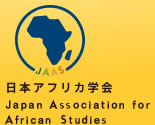
 About JAAS
About JAAS Office
OfficeNew (May,2017)
 "Journal of African Studies" Back Numbers
"Journal of African Studies" Back Numbers "Journal of African Studies"
"Journal of African Studies" Editorial Committee
New (December,2017)
 Annual Meetings
Annual MeetingsNew (May,2017)
 Links
Links Mail to the Association
Mail to the Association Go to Japanese Page
Go to Japanese Page
1. Purpose and mission
The Japan Association for African Studies (JAAS) is an academic society that aims to enhance the development of African studies in Japan through research about the nature, society, and humanities on the African continent and islands nearby.
2. Characteristics
JAAS was established in April 1964 following the massive wave of African independence. Scholars from a variety of academic backgrounds, policymakers and journalists all took part in its establishment. In the beginning, JAAS had about 200 members. Membership has increased over time and currently exceeds 800. The JAAS members include scholars, students, teachers, development professionals, policymakers and members of various NGOs. The inter-disciplinary nature of JAAS is one of its outstanding characteristics. The academic disciplines of its members include political science, law, economics, history, sociology, cultural anthropology, geography, agricultural science, literature, linguistics, arts and crafts, music, physical anthropology, zoology, primatology, botany, earth science, geology and medical science.
3. Main activities
Since the time of its establishment, JAAS has held an annual academic conference. In recent annual conferences, more than 100 academic papers have been presented and discussed. In addition to the annual conference, academic seminars and research meetings are actively organized at the initiative of the JAAS's seven regional branches (Hokkaido, Tohoku, Kanto, Chubu, Kansai, Chugoku-Shikoku, Kyushu).
A biannual peer-review journal, the Journal of African Studies, is the main publication of JAAS. A Board member is chosen to fill the post of editor-in-chief and organizes the editorial committee. Articles of the Journal are available online one year after publication: (https://african-studies.com/en/index_e.html).
Promoting academic exchanges with other related associations both inside and outside of Japan is another important mission for JAAS. Cooperation, of various kinds, with other academic associations has been maintained. We have invited many members of other associations to the annual meetings, seminars and conferences of JAAS.
4. Organization
The General Assembly, consists of all the JAAS membership, and is the ultimate organization for decision making. The General Assembly is held at least once a year, usually at the time of the annual academic meeting. The Board of Councilors (32 member maximum) is elected every three years by a vote of all JAAS members, and the Board of Directors (12 member maximum) is then elected from among them. A president and two vice-presidents are then elected from among the Board of Directors. The president can designate other Directors from members for the purpose of striking a balance with regard to regions, specialties and gender. The number of the Directors must not exceed 15. Current members of the Board of Directors can be found at the following website:
(https://african-studies.com/en/index_e.html).
5. Award
JAAS commends young members (under the age of 40) whose academic publications in African studies are judged to be particularly outstanding with an award. The JAAS Award (two persons maximum) is given at the annual General Assembly. The awardees are nominated by a select committee set up by the Board of Directors.
6. Contact
The Japan Association for African Studies
c/o Dogura & Co.,
1-8, Nishihanaikecho, Koyama, Kita-ku, Kyoto, 603-8148 JAPAN.
Tel. +81-75-451-4844
Fax. +81-75-441-0436
E-mail: info![]() african-studies.com
african-studies.com